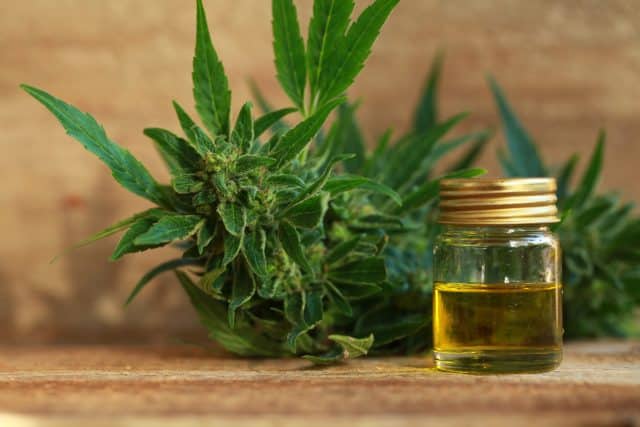There’s been a lot of hype lately about CBD, or cannabidiol, oil. You might see it advertised in your local health food stores, spas, and coffee shops, as those places offer to mix it in with your lotions, coffee, or other beverages.
So what exactly is CBD and why would you want to include it in your daily life?
 Cannabidiol (CBD) is a compound that occurs naturally in cannabis plants. It’s sometimes taken from the same plant as marijuana and sometimes taken from hemp plants. But CBD is not the same thing as the drug marijuana, which consists of the leaves and flowers of the cannabis plant. Studies have shown that it’s tetrahydrocannabinol (THC) that causes people to get high from marijuana, not CBD. According to the World Health Organization (WHO), CBD is not addictive like THC in marijuana.
Cannabidiol (CBD) is a compound that occurs naturally in cannabis plants. It’s sometimes taken from the same plant as marijuana and sometimes taken from hemp plants. But CBD is not the same thing as the drug marijuana, which consists of the leaves and flowers of the cannabis plant. Studies have shown that it’s tetrahydrocannabinol (THC) that causes people to get high from marijuana, not CBD. According to the World Health Organization (WHO), CBD is not addictive like THC in marijuana.
 CBD oil, then, is made up of cannabidiol dissolved in an oil, usually made from hemp seeds or coconut. Although some scientists have stated that research on CBD is limited, others have stated that CBD can have many health benefits. Certain studies say that the oil can be effective in treating seizure syndromes, post-traumatic stress disorder (PTSD), schizophrenia, anxiety, and Alzheimer’s disease. Some researchers have even said it shows great promise in helping to treat certain HIV and nerve damage symptoms.
CBD oil, then, is made up of cannabidiol dissolved in an oil, usually made from hemp seeds or coconut. Although some scientists have stated that research on CBD is limited, others have stated that CBD can have many health benefits. Certain studies say that the oil can be effective in treating seizure syndromes, post-traumatic stress disorder (PTSD), schizophrenia, anxiety, and Alzheimer’s disease. Some researchers have even said it shows great promise in helping to treat certain HIV and nerve damage symptoms.
There is still much that researchers need to discover about CBD, though, including long-term safety effects and impacts on the brain. Research is still ongoing, and some scientists believe that the government should start approving clinical trials so that more medicinal uses can be discovered.
Is CBD oil really safe?
The problem with CBD oil is that many available products (besides the medicine Epidiolex) are not regulated by the Food and Drug Administration (FDA), and they can contain only a small amount of CBD or unwanted additives like THC. That’s what could make it potentially ineffective and even unsafe. Current research states that the ingredient CBD itself is safe, but it could interact poorly with other supplements or medications.
There may or may not be long-term brain affects associated with CBD, but there still isn’t enough research to say for sure. Because most CBD products are unregulated, it’s impossible to know if you’re getting a pure product, which can be potentially dangerous. It’s important to do proper research on a company, its product, and the ingredient label before taking any kind of supplement.
Is it legal?
When CBD is taken from hemp, it’s legal under the Agriculture Improvement Act (Farm Act) that was passed in December 2018. CBD taken from other cannabis plants is likely illegal federally but may be legal under certain state laws.
Where people run into trouble is when they try to sell CBD and CBD products. Many companies have been reported for advertising false health benefits of the oil or for adding it to food. Companies are not allowed to make any kind of unproven health claims about CBD, and since not much research has been done, there really aren’t very many proven health claims to make.
Should I give it a try?
CBD certainly shows a lot of promise, like other “natural” supplements on the market. But because the products are not regulated by the FDA, it’s always best to proceed with caution. You never know exactly what you’re getting.
It’s always best to discuss any new health regimen with your doctor before beginning, especially if you are currently taking other supplements or medications.


























